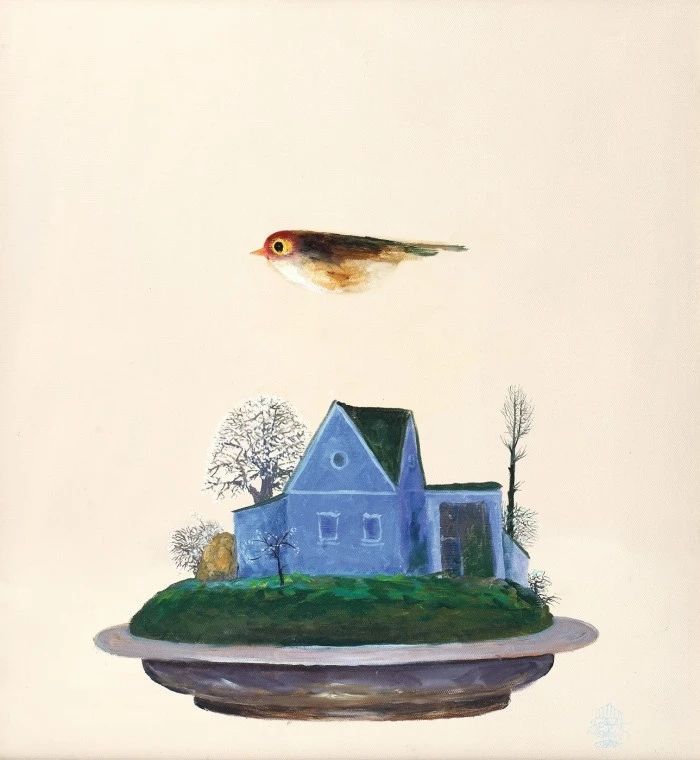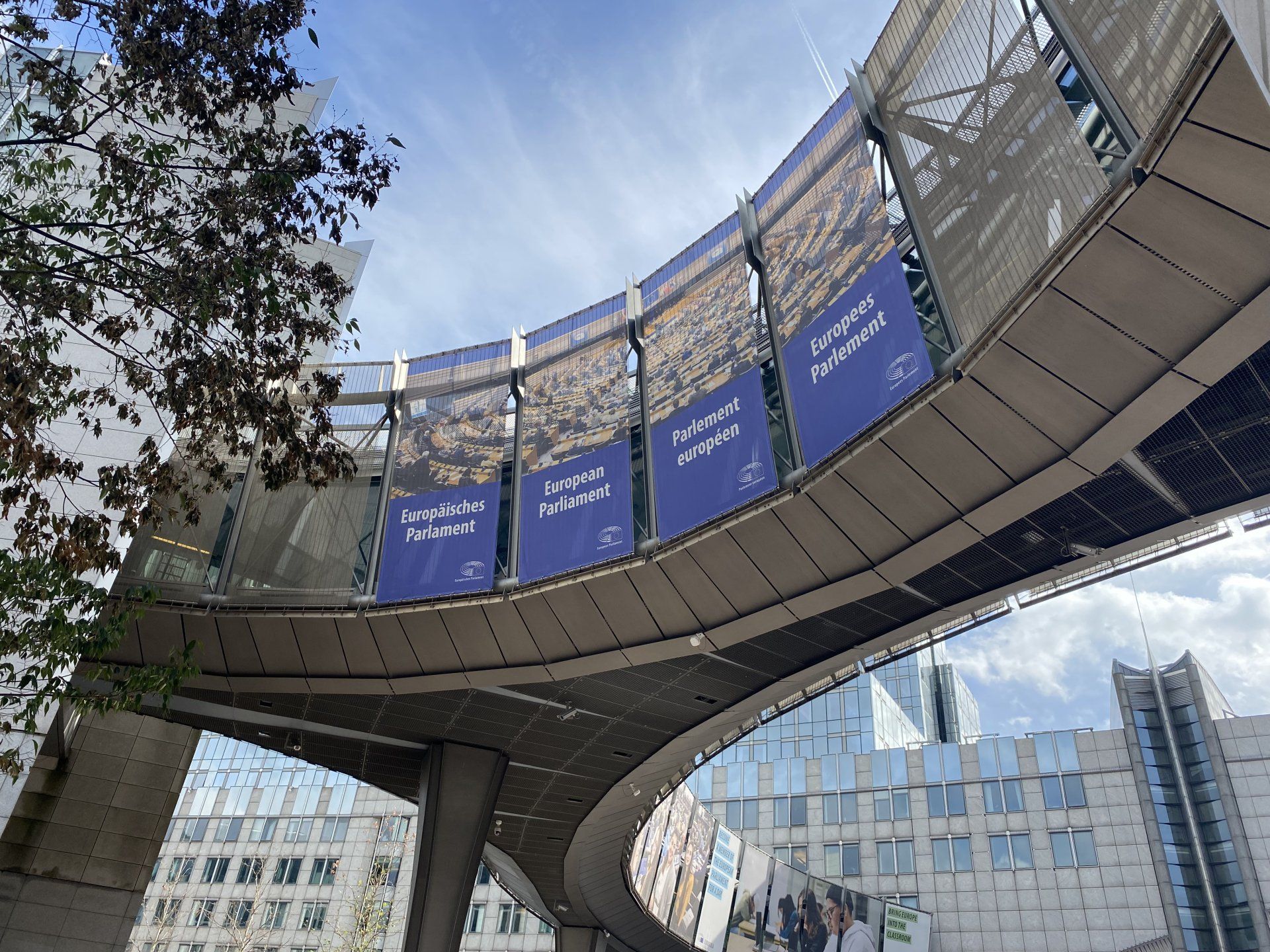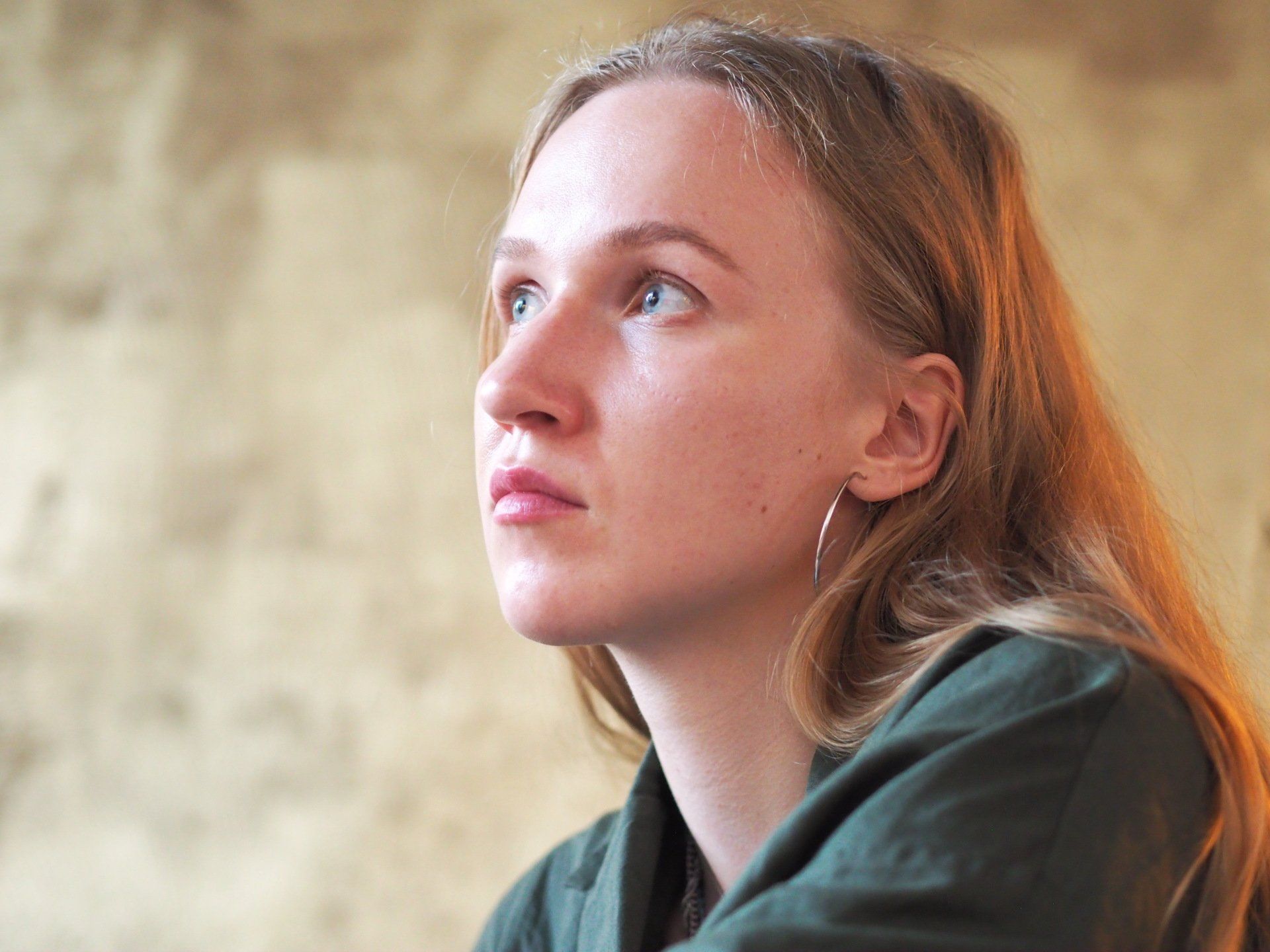Every dogma has its day - and its thought police
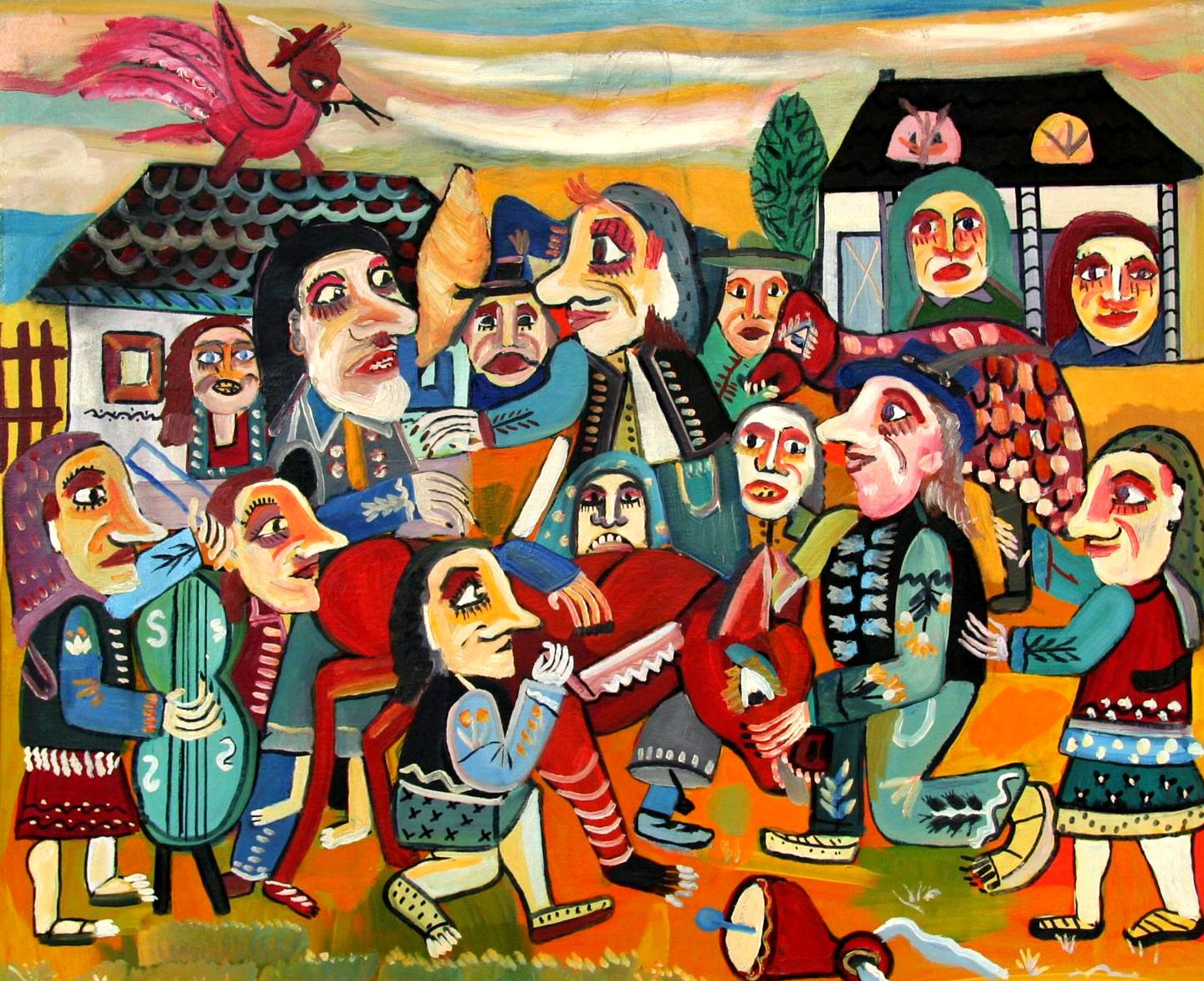
This article was written for John Rapley's Subversity
blog.
It’s the economy, stupid. There’s no magic money tree [stupid]. The age of irresponsibility is giving way to the age of austerity [stupid]. Disagree with this if you dare [but clearly you must be stupid]. Let me explain what is possible [stupid].
“I think people in this country have had enough of experts, from organisations with acronyms […]” Michael Gove, June 2016
We are in the dying days of neoliberal capitalism. Its rulebook lies abandoned, its promises ridiculous, the science behind the doctrine evidently inexact. COVID-19 has hit us hard, when our defences were low. A decade of austerity had depleted our healthcare systems and weakened our social safety nets. The multilateral architecture had been enfeebled by much macho posturing. The free markets were no match for a pesky little virus. Global supply chains faltered instantly, and all emergency actions were undertaken by the public, not the private sector. When the chips were down, our lives took precedence over our economies, solidarity over profit. When we re-emerge, we will be poorer, more vulnerable and less willing to believe that the invisible hand can glue the pieces of our broken world back together. We won’t be told there’s no alternative. Our re-construction will be deliberate, collective, and have people and planet at the heart.
An economistic dogma disciplined us into submission
No one doubts the role that the discipline of neoliberal economics has played in ordering our societies. What we often misunderstand is how it has done that. We assume it was by way of offering a scientific pathway for prosperity and development. Yet benefits we may have derived from its learnings come second to its most powerful contribution - that of sustaining and policing the enforcement of a very particular moral system of assumptions, values and restrictions on behaviour. Economics, like religion once upon a time, has long delineated what we are permitted to think. John Rapley describes this eloquently here.
Tony Judt portrayed the way these limits operate on our imagination in his moving and incisive testament “Ill Fares the Land”:
“Today, we are encouraged to believe in the idea that politics reflects our opinions and helps us shape a shared public space. Politicians talk and we respond – with our votes. But the truth is quite other. Most people don’t feel as though they are part of any conversation of significance. They are told what to think and how to think it. They are made to feel inadequate as soon as issues of detail are engaged; and as for general objectives, they are encouraged to believe that these have long since been determined.”
The scientific aura of economics has helped cement a highly ideological way of ordering society around the key idea that an individualist meritocracy is an evidence-based way of delivering social justice, of making sure there is fairness and balance in the world. This evidence base was always thin at best and not unequivocal. Economics has helped enforce an individualist, competitive worldview by meting out disdain and derision on any alternatives, deemed unscientific, backward and ideological. And frankly, stupid.
Stupidity became the new sinfulness
Stupidity, in the context of a moral order built on striving for progress, is a breach, a contravention, something to be controlled through thought policing and ridicule. In older moral orders, sinfulness would have played the role that stupidity or backwardness play in pre-COVID 19 neoliberal economism.
So successful was this narrative strategy in disciplining ideas that old left-right political divisions became irrelevant in the 1990s (in the era of Clinton, Blair, Schroder and others) as all of politics re-aligned itself with the assumptions of the neoliberal market-first, business-first, justice-through-individual-merit consensus. Anything else began to feel stupid, and risible. Progress was going to be attained through scientific method, not old-fashioned ideology, via purely rational, technocratic processes.
The political contest itself became a managerial competition, a patronising politics of progressive knowledge over backwards ideological conviction, of educating the stupid and looking down on the uncouth. The content of politics was no longer something to be debated, only the competence, the actors and the methods. Embarrassed by the ideological backwardness and stupidity of talking about structural economic injustice, the left dedicated its energy instead to identity politics and individual liberties, unwittingly reinforcing neoliberalism’s individualist filter with entirely noble aims. It simply stopped telling its own moral story, limiting itself to a slightly softer version of the core neoliberal narrative, with the free, worthy individual at the heart. No wonder its constituency grew ever smaller, as ordinary folk chose the main brand over the bleeding-heart imitation.
The success of neoliberal ideology was measured by how ubiquitous it had become, protected by the invisibility cloak of economics as a reassuring scientific base for progress.
Sic transit
In neoliberal societies, the moral order sits on a justice story which, put simply, says “the worthy individual does well”. If you are worthy (through effort, genius, brilliance), you will be successful. If you are not, you will not enjoy rewards. Conversely if you are successful, you must surely have deserved it. And if you are not, it’s probably your own fault. This is what justice looks like. Economics provides the proof (by stating that individuals are self-interested and competitive above all else). It also offers the means for operationalising the justice narrative, by prioritising market competition as a way of determining worthiness. Scientific socialism played a similar role in sustaining the communist totalitarian moral order across many parts of the world after WWII.
With both neoliberal capitalism and totalitarian communism, the narrative held best for as long as it did not sit too uncomfortably with reality. In my native country of Romania, totalitarian Communism didn’t feel awfully scientific or progressive during the hungry years of the mid to late 1980s, when the shops were empty, milk and meat a rare luxury and butter an improbable-sounding invention, the stuff of fairy-tales, surely. The “scientific” bit of socialism felt a bit unlikely when waiting for hours in queues for petrol, so you can drive your Dacia (the only car available), two out of four weekends a month, specifics depending on whether your number plate was an odd or even number.
A similar thing happened in neoliberal capitalist societies in the aftermath of the 2008 crisis. Living standards declined as austerity programmes bit hard. Millions upon millions of people joined the ever-increasing ranks of what Guy Standing termed “the precariat”, a pay cheque away from destitution, living lives of insecurity on low-wage, no-rights, zero-hour contracts. Competing in this callous job market meant that for an increasing number, the reward for worthiness never came. The housing market, clearly an inadequate way of supplying one of the most essential public goods (roofs over heads) pushed a large mass of bodies into ever-shrinking, inadequate, soul-crushing accommodation, rents ever-rising and home ownership a fata morgana.
This affected people from all walks of life, not just the destitute. A few years ago, my senior NGO salary only stretched as far as 85% of our London rent and childcare costs. My reward for worthiness was hand-to-mouth living with a sprinkling of psychological exhaustion and feelings of failure.
The moral order, propped up as it may be by grey-suited economists preaching appropriate thinking, cannot hold indefinitely in dissonance with the lived experience and prevailing mood – one of ever more wintery discontent.
So when Michael Gove cynically told us that people had had enough of experts back in 2016, he was onto something. He knew it with confidence of course, as he was steering a Russian-backed strategy to capitalise on that discontent and shake-up the political (if not economic) consensus. The moral order cannot hold forever if the promised justice looks implausible and undeliverable. If you are looking to gain political ground, it makes sense to cast doubt on the validity of a weakened moral narrative. This is exactly what populist movements have done in Europe and beyond since 2015 (I include Brexit and Trump here). And true to form, the mainstream response was exactly what the economistic neoliberal narrative prescribed: “these guys must be some kind of stupid”.
A new story is emerging
Our new COVID-19 reality means a return to neoliberal economism will not go unchallenged. When the Netherlands insists on fiscal responsibility before solidarity in the worst crisis Europe has known since WWII, the moral order starts looking distinctly strained. We all know we can’t judge Italy as a miscreant during the COVID-19 crisis, as many did Southern Europe every time it was bailed out after 2008. Its predicament is not a result of stupidity or immorality, it has not breached the moral order. It has simply been terribly hit by a very contagious disease with a high mortality rate. We are seeing the callousness of the neoliberal dogma exposed. The perceived desire and collective need for solidarity means the Netherlands are singing a dissonant tune, from a film that has already finished.
This crisis is the very definition of Laclau and Mouffe’s discursive dislocation, a momentous event via which the fabricated aspects of a narrative construction become visible. We see our old dogma in its hollowness. Its political aspects are suddenly obvious, when for decades they were veiled in the illusion of economic science or technocratic common sense. We can see we were making a choice, although we didn’t realise we had a choice. It was our choice to allow a topsy-turvy world where profit came first and justice came never, but we didn’t realise there was an alternative. And we didn’t want to look stupid.
We are creating collective meaning out of shared trauma. After this our societies will not accept private profit as an instrument for delivering social justice. Our new world will be built to deliver the common good. Individuals will not have to compete for survival, they will have a right to thrive and live without fear and humiliation, in a world where our wealth is our common.
This is not utopia. Altruism and community living are the very story of human evolution. Individualist man was humanity’s embarrassing mid-life crisis, all fast cars and inappropriate lovers. As we stare into the rubble of our old world, smoke clearing from the debris, our debts to each other and our planet are clear as day. A new story is being woven, and in this one knowledge from economics or other disciplines will help us deliver on our values, not limit our imaginations. Politics will not disguise itself as technocracy again. This selfish dogma has had its day. We will do much, much better when we re-emerge.
Flare Blog
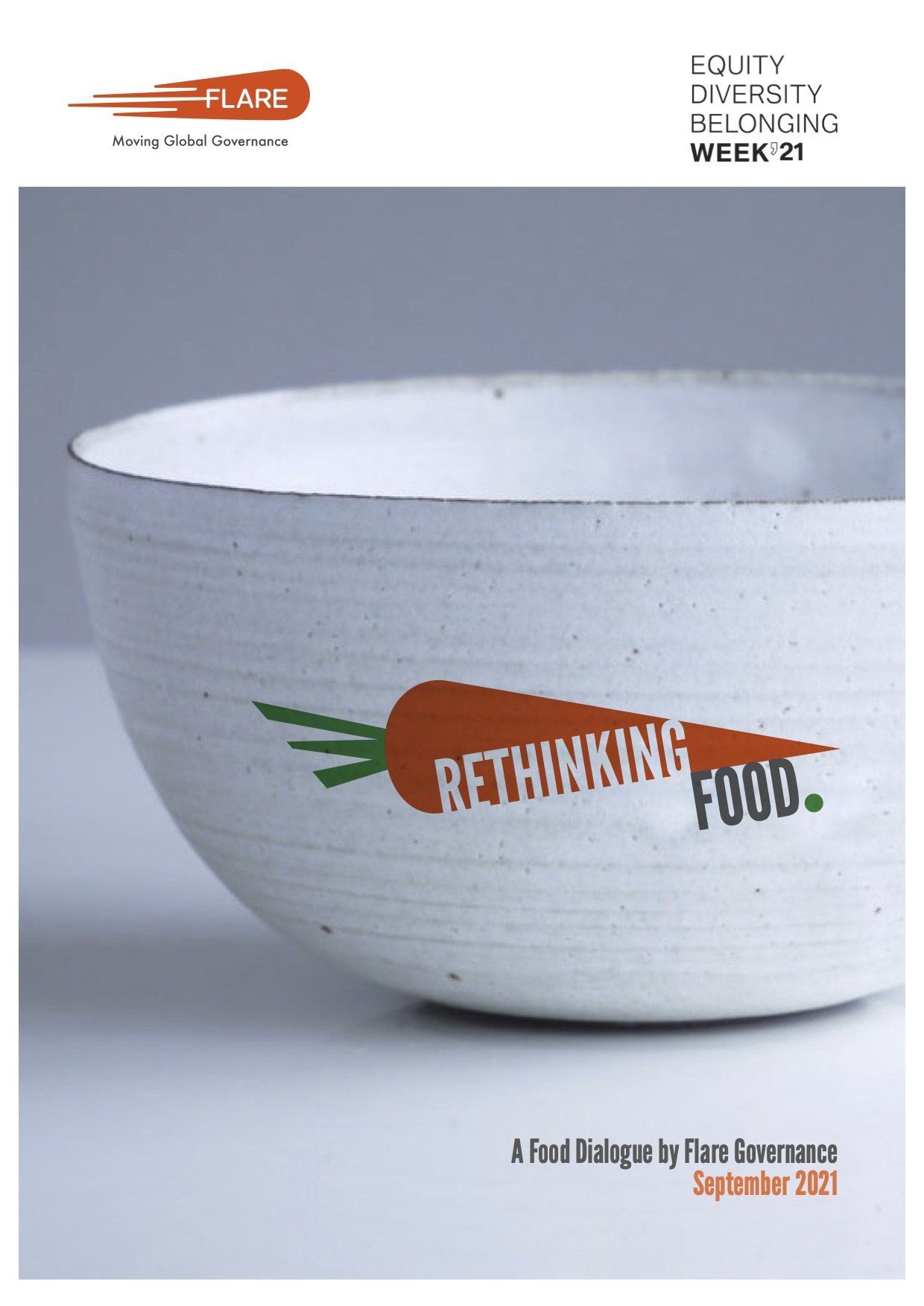
Is making us hungry. Read about how we re-imagined the global food system in 90 minutes in our latest report, available here . This stuff matters. Rethinking is about making space for hope, changing the story by which we live. Moving from me to us to our whole society. We take things that feel stuck and fixed and paint the picture of how they can be radically better. We do it together as equals, no matter our level of knowledge and experience. At the heart of Rethinking we’ve planted a simple seed of an idea. If we agree where we need to get to, we can find our way there. We can work out how to make change happen when we allow ourselves to imagine how things should be. The essential first step to get over our fear of being stuck in the now, in how things are, in feeling there’s no choice and no alternative – is to say what should be. It sounds banal, but it’s actually quite hard. We had a go during Rethinking food a couple of months ago. We’d spent a little while in a small group talking about access to food, injustice, food deserts, class, food snobbery and a multitude of ills. We were stumped when we tried to turn things around and say what “justice” looks like for an overweight single mum working two jobs and living in a “food desert” in the USA. We could see what the multiple injustices were, but naming what should be took us a little while. What should her life be like? What needs to happen to make that possible? You might recognize that pattern from how we approach challenges in public discourse. We’re very used to denouncing bad things, calling emergencies, demanding change from others. It’s a lot harder to name what should be, what the good society looks like, how we will feel when we’ve righted social and environmental wrongs. And once we’ve done that, I promise you, we’re cooking with gas (or something less planet heating). Over the last two years, we’ve developed a simple three-step method that takes people from hopelessness to action, from lone voices to collectives, from me to us. It’s not voodoo. It’s just humans talking, being brave and being nice. We think it can change society. No apologies for optimism. We’ve done it for football and eating , two things that feel like they belong to our private lives, but that are the most powerful embodiment of our moral systems, because we feel them viscerally. We’ve got a couple of high stakes experiments lined up for the end of 2021. If you’re tired and sad and despondent and you despair at the state of the world, please join us, fund us , talk drop us a line on hello@flaregovernance.eu . We have hope flowing out of every pore.

By Lauren Brown Productivity. It’s one of those words that is thrown around – ‘Oh I’ve had such a productive day’. It’s one I’m guilty of using, on those rare occasions where I feel as if my life is tied up into neat ends. It’s the feeling of satisfaction when you manage to get all those tiny tasks on your to-do list ticked off, eat healthily and manage to engage in one of those ‘mind-improving’ habits you set out to do at the beginning at the year. It’s definitely not limited to this sense of personal growth and improvement either but tied inherently into our working lives and culture. It rarely gives us time for rest but instead ‘more’. This productivity culture permeates our lives and is often held up as the way to have more time – that precious ‘more’ time to spend on things we truly love. But as Anne Helen Peterson points out, its mandate is ‘never ‘You figured out how to do my tasks more efficiently, so you get to spend less time working’. It is ‘you figured our how to do your tasks more efficiently, so you must now do more tasks’’. It’s the sense that if you can get that one extra task done a day, you will be far better off for it. And for many, the rewards that come with these tasks (especially those in precarious situations, for whom productivity is just a way to survive basic economic needs) are maybe not all they seem. It’s also tied up in ideals of self-improvement. ‘Oh, if I could just be more productive with my time, I’ll manage to squeeze in Duolingo’. We are taught we must maximise our output (and our consumption for that matter) to be the best we can be, at all times, in every potential area. But we all have a ceiling to this – no one can work infinitely, and at some point, diminishing returns sets in. There’s only so long I can pretend my endless to do list is improving my life, instead of stressing me out that once again I haven’t done X Y and Z. Whilst I could happily spend the rest of this blog theorising how neo- liberalism is a key part of this (don’t worry, I won’t), this sense of disquiet around working cultures has been thrown into sharp relief by the pandemic for many. Debates over whether workers get more done at home or the office are prominent in the news, accompanied by endless articles on burnout culture. Businesses are testing out four-day work weeks – with the caveat that this is obviously to improve productivity, though admittedly through a method that involves ‘working better’. All of these stories question the idea of boundaries. Whether these be physical (home vs an office environment) or mental (when do we ‘switch off’), the pandemic has led to discomfort over our current working practices. I’m a case in point. During the first lockdown, I felt I needed to produce at ever higher rates in order to ‘secure my future’. So I regularly worked 40+ hour weeks (often splitting my time between my supermarket job, research internships and volunteering) as well as finishing my studies. I thought it was normal, desirable even, to only have one ‘proper’ day off a week. I believed this was the best way for me (a busy person even in ‘normal’ pre-pandemic times) to stay sane, to cope with the ever closing walls of the world. But when I compare this to the third lockdown I experienced here in the U.K., this outlook seems obscene and naïve. I struggled to concentrate through my degree and the drudgery of life in my small four walls. However, I still felt I needed to produce at the levels I had been, to make this lockdown a success. I felt I needed to do ‘more’ – I had the time, why wasn’t I doing it? And that’s what is so all-encompassing about this productivity culture. It’s prevalent and fetishized (what do you mean, you don’t have a side hustle?). There’s, as Pandora Sykes identifies in her book Are We Doing it Right?, a status to being busy and getting lots done. It’s also a way of coping with insecure futures and bleak employment prospects. Admittedly this was heightened by a mild personal panic that came with the realisation I was soon to be an unemployed postgraduate student. But is it healthy? It's hard to admit that maybe you can’t improve in every section of your life. That there’s a point where burnout sets in. That maybe you don’t need to learn French or do that typing class, unless you really do have the capacity and desire for it. Maybe we shouldn’t have to be excessively productive. Maybe we should talk about what we actually want for our futures and challenge what we see as normal. I’m not saying productivity is inherently evil and I can’t pretend I’m not sucked into the machinery that surrounds productivity culture. But as time goes on, the apparent need to produce and consume more is one that becomes more questionable to me. At what point can I say I’ve done enough? I might never be able to fully manage the expectations of myself and workplace culture with what actually works for me, but through talking it through, I can start to try.

By Sam Ajakaiye Change. It’s such a small word which encompasses so much. So often I reflect on the various ways I want the world to change and yet I also find myself in a position where I must question whether this very act is naive. Negative change is surely worse than the status quo. Social (and, to a certain extent, political) conservatism is often predicated on this understanding that change can easily break down the good things we have whilst failing to replace them with anything of equal, let alone better, value. I am also a university student. University students are famed for their rampant desire for change and their youthful radicalism. In my first year at university, I have witnessed how a surge in the use of social media and a significantly greater awareness of international affairs has led activism to become commonplace amongst a generation of ‘Social Justice Warriors’. I am also a 19-year old black man who does not only feel society’s divides but actively studies the histories behind them in his degree. How could I not desire change when I see how hypocritical greed has led (and still leads) to the crippling of continents, communities and families in places like my homeland, Nigeria. Perhaps I wouldn’t because those same studies have bred within me a deep distrust for the leaders who have the greatest potential for change - stories of poor Nigerian governance are too numerous to count. If you are struggling to grasp where I lie on the political spectrum or what I want for the future of the world, welcome to the club! I do as well. However, I will clarify one thing for you - I do want change. It’s just that, whilst I am hopeful for a better future, I’m also sceptical about it. The reason why I am sceptical is that I have seen how the realisation of ideals doesn't just require more money, or more time, or more planning. They require people to change. If people don’t change the way that they act, the way they think about others (and themselves) and what they aspire towards, any real systematic change is not possible. For example, over the course of last year, systematic/institutional racism came to the fore of many debates once again. However, whilst systematic racism may have a completely different effect to interpersonal racism, it is certain that any system which places people at a disadvantage is rooted in decisions made by people, influenced by their personal approach to life and others. My hope for change is not rooted in seeing declarations made by governments which suggest that policy will be more aligned with the future I wish to see (otherwise I would be in love with the UN). It’s not when I see thousands of people gather on the streets to protest about problems of global importance. It’s not even when I am allowed to feed into conversations which are far beyond my pay-grade (I’m a student so I basically don’t have one) and share my visions for the world. My hope for change increases in those situations where all performance is stripped away and people are at their most open and vulnerable, yet I see genuine concern and kindness expressed towards others. When I see people truly empathise with each others’ struggles, regardless of whether they fully agree with their viewpoint, and have proactive and serious discussions marked by mutual respect. That’s because these are the types of spaces in which policy should be formed. These are the types of conversations that allow society to become naturally diverse. These are the types of people who will use influence to actually serve people rather than simply to boost their ego. Now, I will introduce a dose of scepticism here. As a Christian, the idea that everybody is flawed and has their own struggles is rooted in my worldview. However, I think I can confidently say that you don’t need the Bible to understand that humans aren’t perfect. There will always be people in power who are self-serving and people whose altruistic actions are only performative. But why should that ever be an argument to maintain the status quo? Instead, that fact should drive us to create as many open and genuine spaces as possible for people to learn about others and learn from others. We should prioritise creating opportunities for individuals to express themselves openly and then take each others’ concerns and opinions seriously. We should allow for debates which enable us to question each others’ views and find solutions to the different problems we experience and perceive. I am still sceptical about how many people will truly change from these spaces but that’s the thing about change - things will be uncertain. These conversations can only function as a starting point of change but, if we neglect this crucial initial point, how can we expect a different end product?
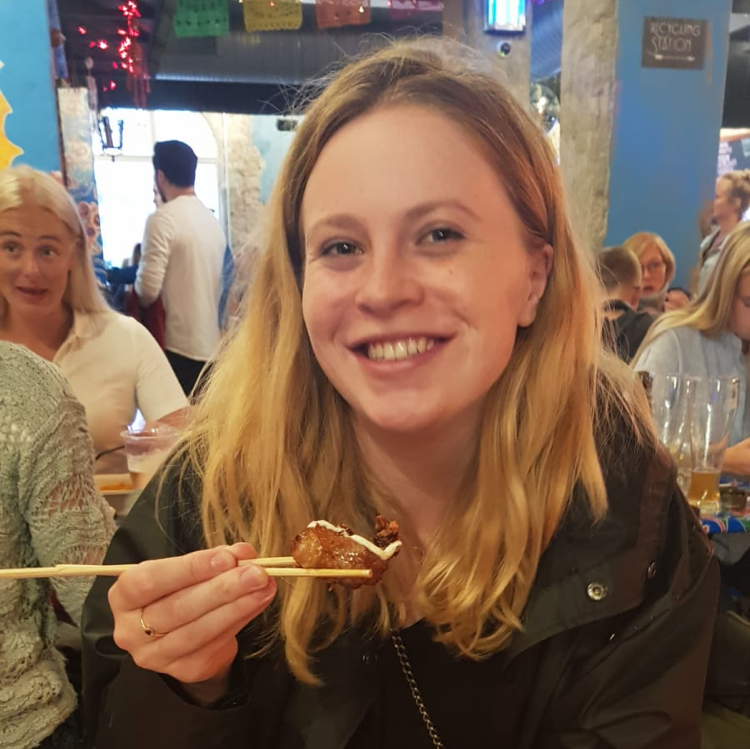
By Lauren Brown Food is something that connects us all – whether it’s a quick stir fry, a hungover takeaway pizza or a Sunday roast around the table with your family and friends. But it is also something that means different things to everyone. As you may be able to tell from the first sentence, a good Sunday roast reminds me of my family, whilst a pizza is my cure-all from a messier night than intended. Despite being a self-proclaimed foodie, and an enthusiastic if not always successful cook, how I feel about food and how it’s produced isn’t something I examine in detail too often. I know I love cooking and sharing food with others, I try to be a mildly successful vegetarian most of the time and I know cheese and chocolate are the primary reasons I would never go vegan. However, it wasn’t until I sat down as part of Flare Governance’s dialogue workshop at the BMW Foundation that I really examined this. Discussing topics from the social and cultural norms around food, to how we produce it, I began to think more and more about how food shapes my life. I began to question what I ate, why I ate it, and what I could do to create a world where I can balance my love for cheese with the environmental considerations of that. How could I feel connected to the food I ate, without knowledge of where and how it was produced, and under what connections? And how could I use food to connect to the people around me? Through discussions in smaller groups, we started to think of both what problems we saw in the world today and what we wanted the future of food to be. Answers to ‘fixing’ the food system varied from prioritising local produce, enriching the soil and inviting everyone to share food together. And at the heart of both these visions and solutions was a desire for food to be just and to work to connect us. It’s this that we should take forward, in order to challenge and to create a food system that is fair and just and belongs to all.


